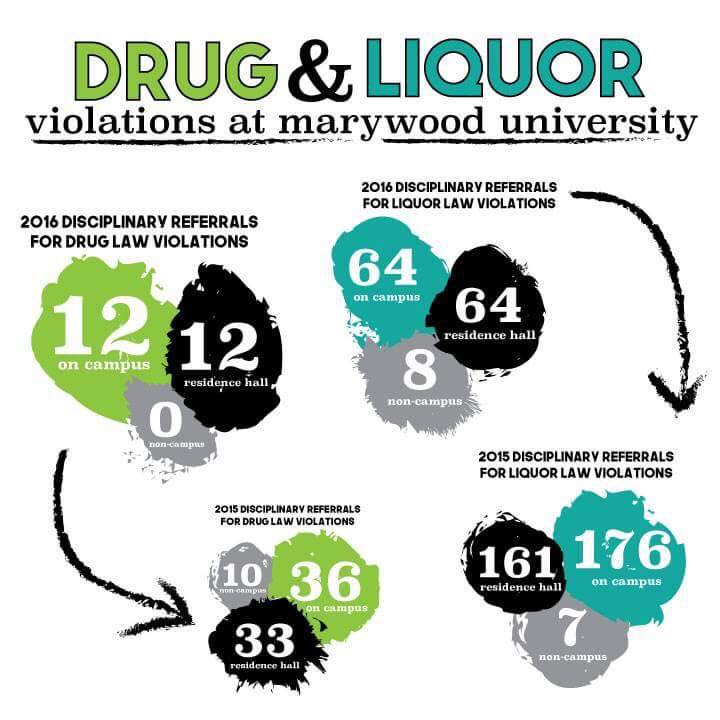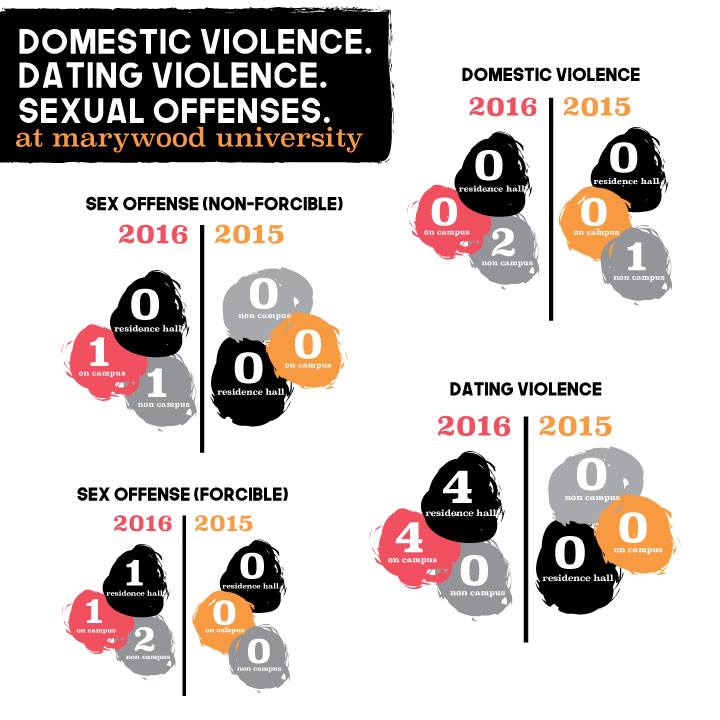Annual Security Report for 2016 shows rise and decrease in offenses
October 30, 2017
Campus Safety released the Annual Security Report for 2016, which showed a decrease in drug and liquor law violations and a slight rise in sex offenses, dating violence and domestic violence.
The report breaks the offenses up into the categories of on-campus, residence halls, public property and non-campus. Below are the highlights from the 2016 report.
Drug and Liquor Law:
No non-campus arrests occurred for drug law violations in 2016, compared to one arrest in 2015.
There were no non-campus disciplinary referrals issued for drug law violations in 2016, compared to 10 in 2015. However, disciplinary referrals for non-campus liquor law violations increased from seven to eight in 2016.
On campus, 12 disciplinary referrals for drug law violations were given in 2016, a decrease from 36 in 2015. Additionally, on-campus disciplinary referrals for liquor law violations decreased from 176 to 64 last year.
In residence halls in 2016, 12 disciplinary referrals were issued for drug law violations, decreasing from 33. Disciplinary referrals for liquor law violations in residence halls also dropped to 64 from 161 in 2015.

Domestic violence:
The report defined domestic violence to include the following:
“… felony or misdemeanor crimes of violence committed by a current or former spouse or intimate partner of the victim, by a person with whom the victim shares a child in common, by a person who is cohabitating with or has cohabitated with the victim as a spouse or intimate partner, by a person similarly situated to a spouse of the victim under the domestic or family violence laws of the jurisdiction receiving grant monies, or by any other person against an adult or youth victim who is protected from that person’s acts under the domestic or family violence laws of the jurisdiction.”
Two cases of non-campus domestic violence were reported in 2016, increasing from no reports in 2015.
No cases of domestic violence were reported in the on-campus or residence hall categories for 2015 or 2016.
Dating violence:
The report defined a perpetrator of dating violence as someone with a current or past “romantic or intimate” social relationship with the victim.
While no cases of dating violence were included in the non-campus category for 2015 or 2016, the report showed four cases of dating violence on campus and four cases in residence halls in 2016. This is an increase from no cases of dating violence in either category in 2015.
Sex offenses:
The report also detailed Marywood’s protocol for sexual assault, sexual assault prevention programs such as PACT and on-campus resources, including the Counseling/Student Development Center and Campus Safety’s Rape Aggression Defense (RAD) program.
The report also detailed “forcible” and “non-forcible” sex offenses in 2016.
Two “forcible” non-campus sex offenses were reported in 2016, compared to zero in 2015.
The report showed two on-campus sex offenses in 2016, one defined as “forcible” and the other as “non-forcible.” There were no on-campus sex offenses reported in 2015.
The residence hall category showed the same numbers of “forcible” and “non-forcible” sex offenses as the on-campus category for 2015 and 2016.

According to the report, Marywood releases this information each year to comply with the Jeanne Clery Disclosure of Campus Security Policy and Crime Statistics Act.
The full 2016 Annual Security Report can be accessed on Marywood’s website.
Contact the writer: [email protected]
Twitter: @BWilliamsTWW





